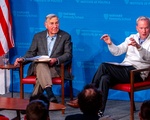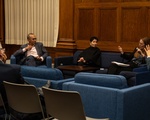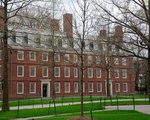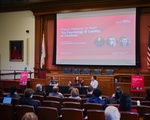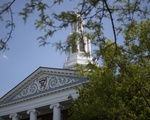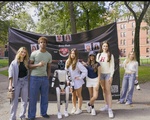Technology
Former Google CEO Eric Schmidt Warns AI Could Think For Itself In Four Years at Harvard Talk
Former Google CEO Eric E. Schmidt predicted that artificial intelligence will be able to learn from itself within four years at a forum hosted by the Harvard Kennedy School on Monday, where he issued a stark warning about the need for limits on autonomous learning.
Humanities Departments Are in Trouble, but ‘Applied Humanities’ Are in Demand, Harvard Panelists Say
The humanities are struggling at universities nationwide — but outside the ivory tower, fields from Silicon Valley to politics need them more than ever, four Harvard professors said at a talk hosted by the English department last week.
Former Employee Sues Harvard for Disability Discrimination
A former Harvard audiovisual technician sued the University and her former manager for disability discrimination and retaliation in state court earlier this month, according to court documents.
Facing Wary Investors and the Lure of Outsourcing, Cambridge Biotech Firms Turn Away From Basic Research
Tariff pressures, a changing regulatory environment, and risk-averse investors have left many Cambridge biotechnology companies seeing decreased new drug development — and outsourcing parts of the research process.
Somerville Incentivizes TransMedics Move With Ten-Year Tax Break
The city of Somerville approved a tax increment financing deal on Oct. 23 that would offer a ten-year, $18 million property tax break to TransMedics — an organ-care technology company — in hopes of motivating the company’s move to Assembly Park.
NYT Journalist Kashmir Hill Warns Emotional Reliance on AI Could Blur Boundaries Between Help and Harm
New York Times reporter Kashmir Hill warned that artificial intelligence systems, many of which are programmed to always agree with the user, could soon shape how people think, feel, and trust in a Thursday panel at the Berkman Klein Center.
Tech Experts See Artificial Intelligence as a Key Resource Ahead of Local Elections
Schneier and Sanders, a Harvard Kennedy School lecturer, co-authored the book “Rewiring Democracy” that was released on Oct. 21. The two appeared at a Cambridge Public Library panel to share more about how citizens can use AI to get involved in politics on Wednesday evening.
Web Outage Leaves Faculty, Students Without Access to Canvas for More Than 12 Hours
Canvas, Harvard’s main platform for classes, was nonoperational for more than 12 hours on Monday due to a widespread web outage, leaving students and professors unable to access class materials and submit assignments.
HBS Professor Says AI Can Boost But Not Replace Human Creativity in HAA Webinar
Jacqueline N. Lane, a professor at the Harvard Business School, argued that artificial intelligence can meaningfully amplify human creativity, but cautioned overreliance on the technology during a webinar on Thursday evening.
Harvard Students Find Okta Verify ‘More Confusing’ Than Duo Mobile
Undergraduates said since the mandatory switch to Okta Verify on Sept. 30 they have found the Okta app “more difficult” to navigate, and several said they were frustrated by the change.
How Alumni Entrepreneurs Are Trying to Redefine Harvard’s Reputation in the Startup World
At the inaugural Harvard Alumni Entrepreneurs Startup World Cup regionals on Sep. 12, Harvard graduates from 12 finalist startups made pitches for the chance to be sent to the championship round in San Francisco.
AI Startup Baffles Harvard Students With ‘Unconventional Marketing’ Tactics
Nathaneo Johnson, a co-founder of the AI-powered social network Series, has spent the past two weeks in Cambridge, employing unorthodox marketing strategies to promote his company to Ivy League students.
Cambridge’s Biotech Industry Threatened by New H-1B Visa Fee
12,000 international workers uphold Massachusetts’s booming technology and biotech industries — including more than 1,000 workers in Cambridge. But new fees on H-1B visas could soon cripple everything from start-ups to big pharma companies in Kendall Square.
Embrace AI or Go Analog? Harvard Faculty Adapt to a New Normal
Nearly three years after ChatGPT arrived on the scene, Harvard’s instructors are adjusting to the technology that has reshaped their classrooms. This fall, the changes have been more visible than ever.



